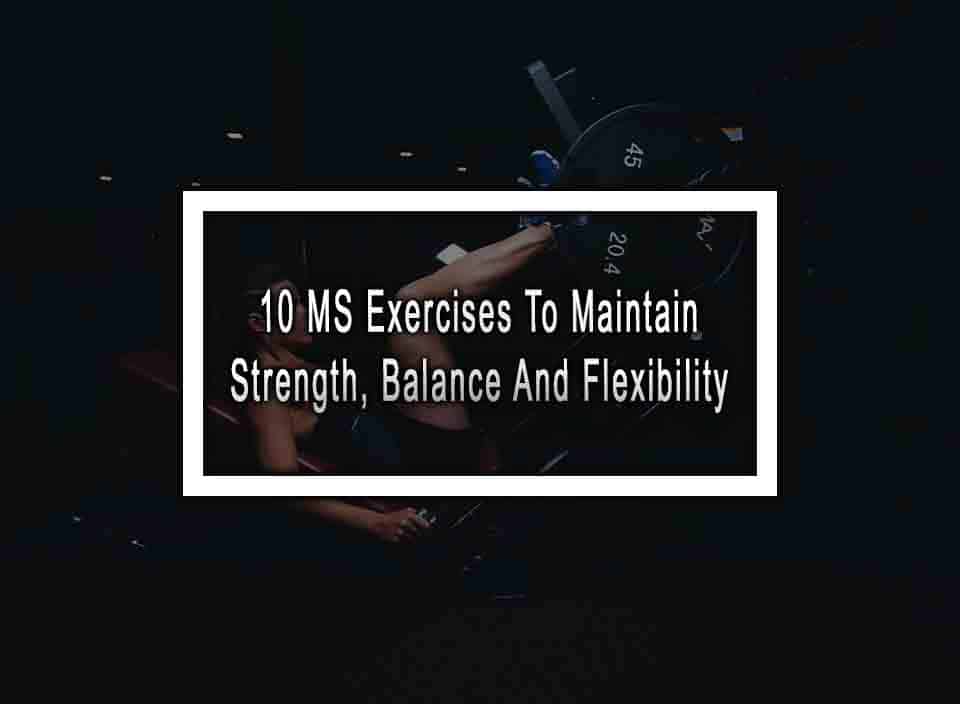Table of Contents
ToggleMS Exercises: Maintaining Physical Function and Overall Health
Multiple Sclerosis (MS) is a chronic and progressive disease that affects the central nervous system. It can cause several symptoms that affect mobility, balance, and coordination. One of the most effective ways to manage these symptoms is through regular exercise. Studies have shown that exercise can help people with MS improve their physical function, increase energy, and reduce fatigue. In this article, we will explore ten MS exercises that can help individuals maintain their strength, balance, and flexibility.
1. Yoga
Yoga is a low-impact exercise that can improve flexibility and balance while reducing stress and anxiety. Practicing yoga can help individuals with MS build strength, improve posture, and reduce fatigue. Some of the recommended yoga poses for people with MS include the tree pose, the warrior II pose, and the downward-facing dog.
2. Resistance Band Exercises
Resistance band exercises can help strengthen muscles, improve balance, and prevent falls. The resistance band can be used to target different areas of the body, such as the arms, legs, and core. Some of the recommended resistance band exercises for people with MS include the chest press, the bicep curl, and the leg press.
3. Swimming
Swimming is a low-impact exercise that can help people with MS improve their cardiovascular fitness, muscle strength, and flexibility. Swimming can also reduce the impact of gravity on the body, making it a suitable exercise for individuals with mobility issues. Some of the recommended swimming exercises for people with MS include the breaststroke, the backstroke, and the sidestroke.
4. Tai Chi
Tai Chi is a gentle form of exercise that can help improve balance, coordination, and flexibility. Practicing Tai Chi can also reduce stress and anxiety, which are common symptoms of MS. The slow and controlled movements of Tai Chi can be modified to suit the individual’s physical abilities. Some of the recommended Tai Chi exercises for people with MS include the Cloud Hands and the Golden Rooster.
5. Cycling
Cycling is a low-impact exercise that can help people with MS maintain their cardiovascular fitness, muscle strength, and flexibility. Cycling can also be done indoors or outdoors, making it a suitable exercise for all seasons. Some of the recommended cycling exercises for people with MS include the stationary bike, the recumbent bike, and the elliptical machine.
6. Pilates
Pilates is a low-impact exercise that can help improve core strength, posture, and flexibility. Practicing Pilates can also reduce the risk of falls and improve overall body awareness. Some of the recommended Pilates exercises for people with MS include the pelvic tilt, the spine stretch, and the single-leg stretch.
7. Walking
Walking is a low-impact exercise that can help people with MS maintain their cardiovascular fitness, muscle strength, and flexibility. Walking can also be done indoors or outdoors, making it a suitable exercise for all seasons. Some of the recommended walking exercises for people with MS include Nordic walking, the treadmill walk, and the stair climb.
8. Stretching
Stretching is a low-impact exercise that can help people with MS improve their flexibility, reduce muscle stiffness, and prevent falls. Stretching can be done at home or in a class setting, making it a convenient exercise for individuals with mobility issues. Some of the recommended stretching exercises for people with MS include the hamstring stretch, the hip flexor stretch, and the shoulder stretch.
9. Balance Exercises
Balance exercises can help people with MS improve their stability, prevent falls, and increase mobility. Balance exercises can be done at home or in a class setting, making it a convenient exercise for individuals with mobility issues. Some of the recommended balance exercises for people with MS include the single-leg stand, the heel-to-toe walk, and the one-leg balance.
10. Strength Training
Strength training can help people with MS improve their muscle strength, prevent muscle loss, and increase mobility. Strength training can be done at home or in a gym setting, making it a convenient exercise for individuals with mobility issues. Some of the recommended strength training exercises for people with MS include the chest press, the leg press, and the seated row.
Conclusion
In conclusion, incorporating regular exercise into your daily routine can help manage the symptoms of MS and improve your overall physical function. By practicing the recommended MS exercises such as Yoga, resistance band exercises, swimming, Tai Chi, cycling, Pilates, walking, stretching, balance exercises, and strength training, individuals can maintain their strength, balance, and flexibility. It is important to consult a healthcare provider before starting any new exercise program, especially with MS, to ensure that it is safe and appropriate for your specific needs. By incorporating these exercises into your daily routine and maintaining a healthy lifestyle, you can help manage your MS and feel your best.
MS Exercises FAQ
Here are the most common questions about MS exercises.
1. Are there any specific exercises that should be avoided?
It is important to consult with a healthcare professional before beginning any exercise program, as there may be certain exercises that should be avoided based on an individual’s specific MS symptoms and limitations.
2. How much exercise should someone with MS do?
The amount of exercise an individual with MS should do depends on their overall health and specific limitations. It is important to consult with a healthcare professional to determine a safe and effective exercise program.
3. Can exercise worsen MS symptoms?
It is possible for exercise to worsen MS symptoms in some individuals. However, with proper guidance and monitoring from a healthcare professional, exercise can be safe and beneficial for many people with MS.
4. Can exercise help reduce MS symptoms?
Yes, exercise can help reduce certain MS symptoms, such as fatigue, spasticity, and depression. Exercise can also improve overall physical and mental health.
5. Can exercise slow the progression of MS?
There is some evidence to suggest that regular exercise may help slow the progression of MS. However, more research is needed to fully understand the potential benefits. It is important to consult with a healthcare professional before beginning any exercise program.












